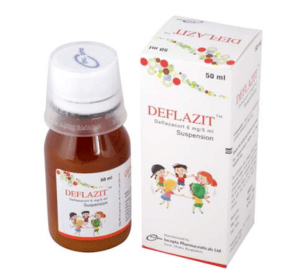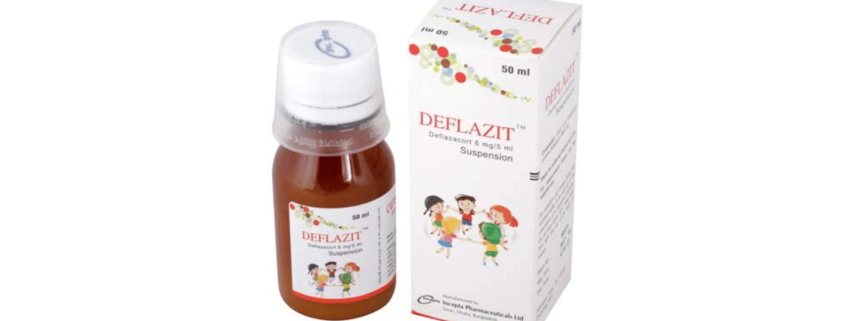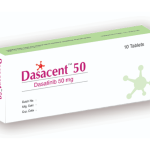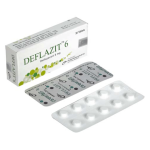Deflazit(Deflazacort)

Therapeutic Group: Analgesic, Anti Inflammatory
Presentation
Deflazit 6 Tablet: Each tablet contains Deflazacort INN 6 mg.
Deflazit 24 Tablet: Each tablet contains Deflazacort INN 24 mg
Deflazit 50 ml Suspension: Each 5 ml Suspension contains Deflazacort INN 6 mg
Deflazit 18 Tablet: Each tablet contains Deflazacort INN 18 mg.
Description
Deflazacort is an oxazoline derivative of prednisolone with anti-inflammatory and immunosuppressive activity. Deflazacort is a glucocorticoid and 6mg of Deflazacort has approximately the same anti-in¬flammatory potency as 5mg Prednisolone or prednisone. Deflazacort works by acting within cells to prevent the release of certain chemicals that are important in the immune system. These chemicals are normally involved in producing immune and allergic responses, resulting in inflammation. Deflazacort also decreases the numbers of white blood cells circulating in the blood. This, along with the decrease in inflammatory chemicals, can prevent the rejection of organ transplants, as it prevents the body from attacking foreign tissue. It is useful for the treatment of certain types of leukaemia, where there is an abnormally large production of certain white blood cells, and for treating certain diseases that are caused by the immune system attacking tissues in the body (autoimmune diseases).
Indications
• Severe allergic reactions, e.g anaphylaxis
• Asthma
• Rheumatoid arthritis, juvenile chronic arthritis, polymyalgia rheumatica
• Inflammatory bowel disease such as Crohn’s disease and ulcerative colitis
• Inflammatory disorders of the kidney, such as nephrotic syndrome and interstitial nephritis
• Inflammatory eye disorders, eg uveitis, optic neuritis
• Inflammatory skin disorders, including pemphigus vulgaris, bullous pemphigoid and pyoderma gangrenosum
• Inflammatory disease of the skin and muscles (dermatomyositis)
• Systemic lupus erythematosus
• Mixed connective tissue disease
• Rare condition involving inflammation in the walls of arteries (polyarteritis nodosa)
• Sarcoidosis
• Rheumatic carditis
• Cancer of the bone marrow (multiple myeloma)
• Acute and lymphatic leukaemia
• Cancer of the lymph nodes (lymphoma)
• Idiopathic thrombocytopenia purpura
• Anaemia caused by the immune system attacking red blood cells (autoimmune haemolytic anaemia)
• Helping to prevent the immune system attacking a transplanted organ, eg heart, liver, kidney etc.
Dosage & Administration
Adults: Usual maintenance 3-18 mg daily (acute disorders, initially up to 120 mg daily).
Child 1 month–11 years: 0.25–1.5 mg/kg daily or on alternate days; up to 2.4 mg/kg (max.120 mg) daily in emergency situations.
Child 12–17 years: 3–18 mg daily or on alternate days; up to 2.4 mg/kg (max. 120 mg) daily in emergency situations.
When Deflazacort is used for long term, the maintenance dose should be kept as low as possible. Dosage may need to be increased during exacerbation of illness. It should not stop taking this medicine suddenly if it has been taking for more than three weeks. This is because long-term use of corticosteroids can suppress the natural production of corticosteroids by the adrenal glands, which means that the body becomes temporarily reliant on the medicine. When it is time to stop treatment the dose should be tapered down gradually, to allow the adrenal glands to start producing adequate amounts of natural steroids again.
Hepatic Impairment: In patients with hepatic impairment, blood levels of Deflazacort may be increased. Therefore the dose of Deflazacort should be carefully monitored and adjusted to the minimum effective dose.
Renal Impairment: In renally impaired patients, no special precautions other than those usually adopted in patients receiving glucocorticoid therapy are necessary.
Elderly: In elderly patients, no special precautions other than those usually adopted in patients receiving glucocorticoid therapy are necessary.
Side Effects
Psychological problems, weight gain, GI disturbances, musculoskeletal, endocrine, ophthalmic, fluid and electrolyte disturbance, susceptible to infection, impaired healing, hypersensitivity, bone fractures, osteoporosis, edema, peptic ulcer, Cushing’s syndrome, skin atrophy, striae, menstrual disturbances, telangiectasia, acne, myocardial rupture following recent myocardial infarction, thromboembolism.
Precautions
The following clinical conditions require special caution and frequent patient monitoring is necessary-
Adrenal suppression and infection, child, adolescents, elderly, history of TB and steroid myopathy, hypertension, recent myocardial infarction, congestive heart failure, liver failure, renal impairment, diabetes mellitus and glaucoma (including family history), osteoporosis, corneal perforation, epilepsy, peptic ulcer, hypothyroidism, pregnancy and lactation.
Use in Pregnancy & Lactation
Pregnancy: Deflazacort does cross the placenta. However, when administered for prolonged periods or repeatedly during pregnancy, corticosteroids may increase the risk of intra-uterine growth retardation.
As with all drugs, corticosteroids should only be prescribed when the benefits to the mother and child outweigh the risks.
Nursing Mother: Corticosteroids are excreted in breast milk, although no data are available for Deflazacort. Doses of up to 50 mg daily of Deflazacort are unlikely to cause systemic effects in the infant. Infants of mothers taking higher doses than this may have a degree of adrenal suppression but the benefits of breast feeding are likely to outweigh any theoretical risk.
Drug Interaction
The following medicines may interact with Deflazacort-
Antacids, ACE inhibitors, acetazolamide, adrenergic neuron blockers, antidiabetics, aspirin, barbiturate, β-blockers, calcium-channel blockers, carbamazepine, carbenoxolone, cardiac glycosides, clonidine, coumarins, diazoxide, diuretics, erythromycin, hydralazine, ketoconazole, methotrexate, methyldopa, mifepristone, minoxidil, moxonidine, nitrates, nitroprusside, NSAIDs, oestrogens, phenytoin, primidone, rifamycins, ritonavir, somatropin, β2 sympathomimetics, theophylline, vaccines.
Commercial Pack
Deflazit 6 Tablet: Each box contains 3 Alu-PVC blister strips of 10 tablets.
Deflazit 24 Tablet: Each box contains 2 Alu-PVC blister strips of 10 tablets.
Deflazit 50 ml Suspension: Each bottle contains 50 ml Deflazacort Suspension
Deflazit 18 Tablet: Each box contains 2 Alu-PVC blister strips of 10 tablets.



